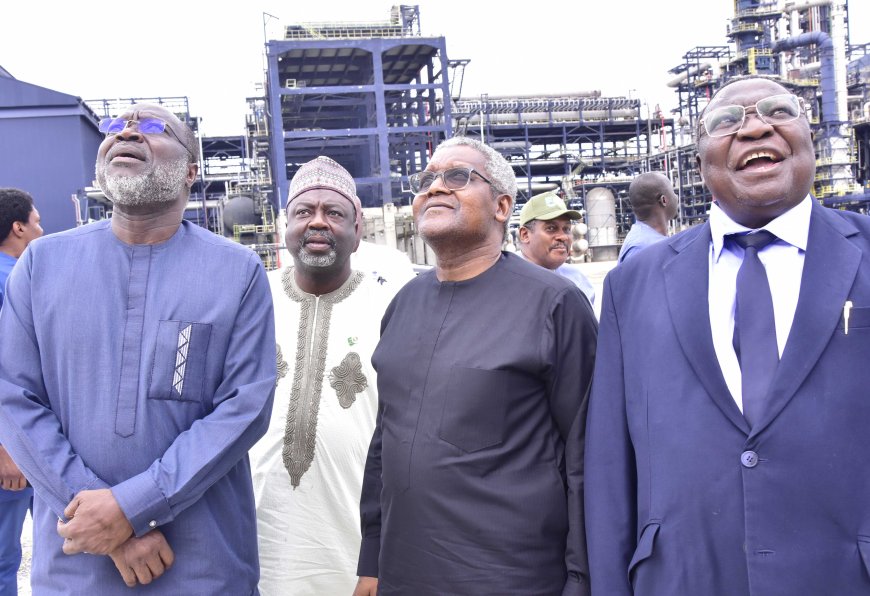Dangote Refinery: A Beacon of Hope for Africa's Industrial Future, ECOWAS Leaders Affirm
Dangote Refinery: A Beacon of Hope for Africa's Industrial Future, ECOWAS Leaders Affirm

L-R; President of the ECOWAS Commission; H. E. Dr. Omar Aliau Touray ; ECOWAS Commissioner for Internal Affairs; Prof. Nazifi Abdullahi Darma; President/ CE, Dangote Industries Ltd, Aliko Dangote; ECOWAS Commissioner for Infrastructure, Energy and Digitalisation; Sédiko Douka; During President of the ECOWAS Commission and His Team Visit to Dangote Petroleum Refinery and Fertiliser Plant in Lekki, Lagos on Thursday,; May 29, 2025
LEKKI, Lagos, Nigeria – Towering over the Lekki Free Zone with the Atlantic Ocean as its backdrop, the Dangote Petroleum Refinery has long been envisioned as a symbol of Nigeria’s industrial prowess. Now, that vision has received a powerful endorsement from the highest political and economic bloc in West Africa. A high-level delegation from the Economic Community of West African States (ECOWAS) has hailed the 650,000 barrels-per-day facility as a beacon of hope for Africa’s future and a testament to the private sector's capacity to drive regional industrialization.
During a recent visit to the state-of-the-art facility, H.E. Dr. Omar Alieu Touray, President of the ECOWAS Commission, visibly moved by the sheer scale and sophistication of the refinery, declared, “What I have seen today gives me a lot of hope, and everybody who doesn't believe in Africa should come here. Visiting here will give you more hope because this is exactly what our continent should focus on.” He congratulated Alhaji Aliko Dangote for his immense trust in Africa, describing his vision as something to be universally encouraged.
The ECOWAS delegation, which included Commissioner for Infrastructure, Energy and Digitalisation, Sediko Douka, and Commissioner of Internal Services, Prof. Nazifi Abdullahi Darma, among others, noted the refinery's crucial role in enabling the ECOWAS region to meet its 50ppm sulphur limit for petroleum products—a standard that many imported fuels currently fail to meet, posing significant health and environmental risks.
“We are still importing products below our standard when a regional company such as Dangote can meet and exceed these requirements,” Dr. Touray emphasized, urging the private sector to take the lead in ECOWAS industrialization.
The visit served as a critical platform for dialogue, with Dr. Touray stressing the need for stronger collaboration between governments and the private sector. He called for policy decisions to reflect the real challenges and opportunities faced by African industrialists, highlighting that as ECOWAS celebrates its 50th anniversary, there's a renewed commitment to actively engage the private sector. "We cannot continue to make decisions on behalf of the private sector from a distance," he stated, asserting that firsthand insights gained from such visits are invaluable for addressing bottlenecks.
Dr. Touray articulated a clear vision for the region: an industrial strategy capable of tackling deep-rooted challenges like youth unemployment, poverty, and insecurity. He asserted that while governments strive for these goals, "Only the private sector can deliver the scale of impact required." He pledged the Commission’s full support for enabling regional giants like Dangote Group to access wider ECOWAS markets and urged other African nations to emulate Nigeria’s example by developing infrastructure that serves the continent, not just individual countries.
Leading the ECOWAS delegation on a detailed tour, Aliko Dangote, President of Dangote Group, recounted the immense challenges and significant milestones in bringing the world’s largest single-train refinery to fruition. He passionately reiterated his longstanding belief that Africa’s continued dependence on imported goods is unsustainable and a major impediment to economic sovereignty. "As long as we continue importing what we can produce, we will remain underdeveloped," Dangote declared. "This refinery is proof that we can build for ourselves at scale, to global standards.”
Countering past skepticism, Dangote affirmed that the refinery is fully equipped to meet the petroleum needs of Nigeria and the entire West African region. He highlighted the tangible impact on local prices, citing how diesel prices crashed from N1,700 to N1,100 upon local production commencement, and have since fallen further, providing significant relief to industries, mining, and agriculture. He also pointed out that Nigerians are currently paying significantly less for petrol – N815 to N820 per litre at the refinery, compared to an average of $1 (N1,600) per litre in neighboring countries.
"Many Nigerians don’t realize that they are currently paying just 55% of what others in the region are paying for petrol," Dangote noted, emphasizing that this reduction is a direct result of local refining, enhancing fuel affordability and energy security. He teased a "much larger initiative in the pipeline" for Nigerians, reinforcing that "this refinery is built for them, and they will enjoy the maximum benefit from it.”
The visit by ECOWAS leaders solidified the Dangote Refinery's standing not just as an industrial asset, but as a potent symbol of African potential and a catalyst for regional economic integration and self-sufficiency.






















